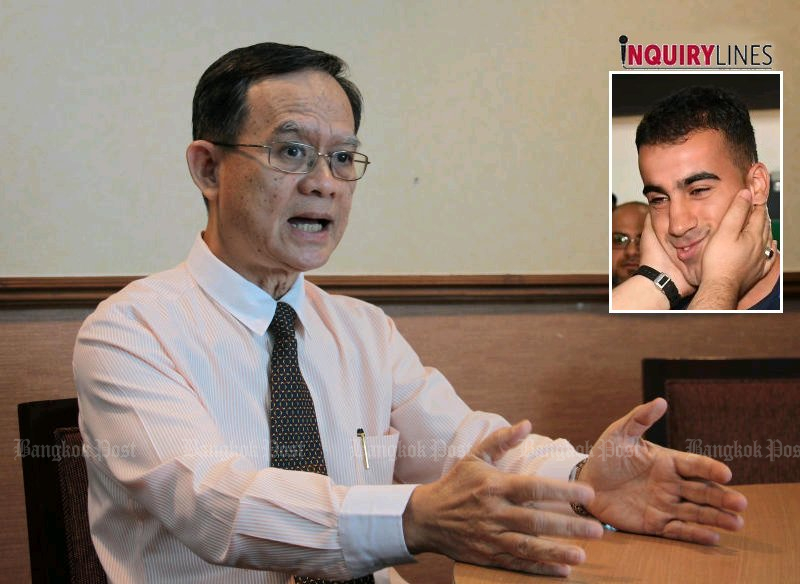
Among those involved in the case of Bahraini refugee footballer, Hakeem al-Araibi, which culminated in his return to Australia, was Chatchom Akapin, director-general of the Office of the Attorney General (OAG)'s International Affairs Department,who admits staff were worried about how it would turn out.
It was a relieved Mr Chatchom who delivered the news to the media that the prosecution had withdrawn its request to have Araibi extradited to Bahrain.
This resulted in the Criminal Court last Monday approving the release of Araibi, who departed Thailand shortly after midnight that evening for Australia, where he was warmly greeted by his supporters. This put an end to his months-long ordeal in Thailand.
Mr Chatchom, who was drawn into the tug-of-war between Australia and Bahrain over the extradition of Mr Araibi, spoke to the Bangkok Post in an exclusive interview in which he said that his team came under intense scrutiny over their handling of the case.

InquiryLines, published bi-weekly on Mondays is a Bangkok Post column to present in-depth details of a range of issues from politics and social interest to eye-catching everyday lives.
Araibi, who was granted refugee status by Australia, was arrested at Suvarnabhumi airport on Nov 27 last year based on an Interpol notice issued at Bahrain's request. He had travelled to Thailand with his wife for their honeymoon.
He had been convicted of vandalising a police station in Bahrain and sentenced to 10 years in prison in absentia but denied the crime.
"Bahrain asked to have Hakeem extradited to face prosecution by showing evidence he committed the wrongdoing and had been convicted by the court," Mr Chatchom said.
"We considered this fell into the criteria where we could assist in line with legal principles so we filed the case with the court," he said.
As soon as Araibi's detention became public, the Australian government made it clear that it had granted him refugee status and he should be released immediately according to United Nations protocol.
"We considered that this point was irrelevant as the wrongdoing had been committed before he was granted the refugee status in Australia," counters Mr Chatchom.
The court was then scheduled to hear the case on April 22.
However, the department was later informed by the Foreign Ministry that Bahrain was no longer interested in pursuing the extradition of Araibi, Mr Chatchom said.
This prompted the prosecution to withdraw its request to have him extradited to Bahrain.
Mr Chatchom believes the case's happy ending stemmed from cooperation between the government, the Foreign Ministry and the OAG.
He credits Foreign Minister Don Pramudwinai for his role in travelling to Bahrain to hold face-to-face talks regarding a matter that had quickly become a matter of international interest.
"I thank the prime minister and the government for sending Mr Don to talk with the Bahraini prime minister. This helped Bahrain sympathise with the position Thailand found itself in," Mr Chatchom said.
According to the director-general, extraditions are enacted either according to bilateral treaties or by reciprocal approaches. More than 10 countries in Europe and Asia have extradition treaties with Thailand.
For those without extradition treaties, they need to inform the Thai authorities that they would offer the same assistance if requested by Thailand, he said, adding Bahrain had made this promise to Thailand.
"Legal officers are always working under pressure," said Mr Chatchom, "but in this case, if you ask whether we were worried, I would say yes."
He conceded the country had never faced an extradition request against an individual who had been granted refugee status.
"It is more common to see two countries compete for suspects to be extradited to face prosecution in their nations," Mr Chatchom said.
"On average, we receive about 10 extradition requests every year," said Mr Chatchom, adding the number of requests has risen for cases linked to economic crimes, including hacking offences, fraud and call centre scams.
Other cases tend to concern homicide, narcotics and terrorism, he said.
Thailand itself has, at times, sought the extradition of suspects hiding in foreign countries for similar offences, he said without elaborating on which nations these requests had been made to in the past. "The extradition process takes time, particularly paperwork where translation is needed," Mr Chatchom said.
According to him, Thailand has extradited suspects to foreign countries more often than it has sought to forcibly repatriate Thai nationals. This may be because foreigners who commit crimes often flee to Southeast Asia, he noted.
"This year, the number of extradition cases [we are dealing with] is more than in previous years," Mr Chatchom said. "All the cases are being processed in line with the law."
In Asean, Thailand has extradition treaties with Malaysia and Cambodia. Malaysia, he said, has extradited various suspects to Thailand, including those behind the bombing in Bangkok's Soi Pridi Banomyong in 2012.
Whether or not suspects can be extradited depends on the legal systems of the countries involved, Mr Chatchom said.
"Some cases take years," he said, referring to Thailand's pursuit of Rakesh Saxena, who was convicted of embezzlement from the Bangkok Bank of Commerce, and whose extradition proceedings lasted 13 years. He was finally extradited from Canada to Thailand in 2012.
It is often difficult to apprehend suspects who have fled overseas, especially those with access to large sums of money, Mr Chatchom said.